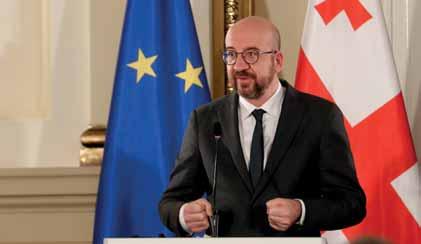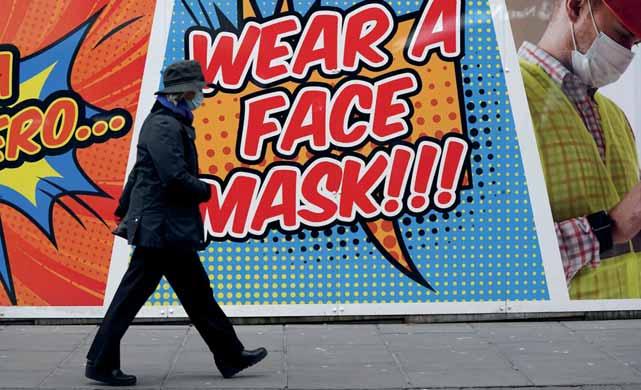
19 minute read
NEWS
from Issue #1304
Corona Updates: Georgia to Kick off Mass COVID-19 Vaccination
BY ANA DUMBADZE
Advertisement
Following the lifting of several COVID-19 restrictions, the number of newly detected coronavirus cases daily has continued to increase in Georgia.
The increase is signifi cant, and is causing concern among epidemiologists, who call on the population not to relax and to continue observing safety norms, such as maintaining social distance, washing hands and wearing face masks indoors and on public transport.
During the week, the country recorded no less than 1000 new cases and 10 deaths on a daily basis.
Considering the increased risk of pandemic spread, on July 2, Georgian Airways announced that starting from July 5, all vaccinated persons will also need to submit a negative PCR.
“Dear ! Further to the existing regulations, updates have been made and starting from July 5, all vaccinated persons will also need to submit a negative PCR test result not older than 72 hours upon arrival at the airport, along with a document confi rming a full course of Covid vaccine,” read the statement.
The total number of confi rmed cases reached 372,685 on Wednesday, among them, 356,780 people had recovered and 5394 died.
Presently, the daily test-positivity rate stands at 3.65%.
Of 633 critical patients, 164 require mechanical ventilation.
THE VACCINE
The good news was that on July 2, the country received one million doses of the Chinese Sinopharm and Sinovac vaccines. The reservation window for Sinopharm was opened for a period of two weeks, after which the registration for Sinovac will start.
Unfortunately, on Saturday, the vaccination registration portal booking. moh.gov.ge was hacked, which hindered the process for those seeking to book their place throughout the day. The Ministry of Internal Affairs is investigating the cyber-crime.
The next day, Deputy Minister of Health Tamar Gabunia stated that despite the web portal resuming work, only about 27,000 bookings, fewer than expected, had been made.
Gabunia warned that the number of daily new coronavirus cases was still high and the healthcare sector is fully mobilized.
“There are 100,000 bookings open for citizens,” Gabunia claimed, going on to call on the population not to postpone immunization. She said that 160 vaccination centers across Georgia were involved in the mass immunization program, while up to 350 COVID-19 vaccination teams across the country were ready to start vaccinating.
NCDC Head Amiran Gamkrelidze also claimed that the vaccination process is moving forward, “but specialists are not satisfi ed with the pace.” "About 6,000 doses have been booked today. Activity is gradually increasing, but the pace, of course, does not satisfy us. 33,000 bookings were made for Sinopharm, which was launched yesterday. Slightly more than 5,000 people were vaccinated on Monday and Tuesday.
“The epidemic situation is unfortunately deteriorating. The positivity rate is going up, the only way to stop it is mass vaccination," he noted.
The country awaits another one million doses of coronavirus jabs in the coming weeks.
As of July 7, a total of 277,872 vaccinations had been administered, while 109,825 people can claim to be fully vaccinated.
Booking a vaccine is possible online at booking.moh.gov.ge, or through hotline 1522.
THE GLOBAL SPREAD
Regarding the COVID situation and the spread of the Delta (Indian) strain worldwide, the situation still remains alarming.
Some epidemiologists in Georgia believe that the Indian strain will completely replace the traditional strain in the country within a few weeks.
In order to prevent the spread of Delta, a number of European countries have already introduced restrictions on arrivals from countries that have recorded higher numbers of Delta variant cases. However, experts believe that it is only a matter of time until the variant entirely takes off in mainland Europe.
The Delta variant now accounts for half of the Covid-19 cases in many areas of the US, President Joe Biden said Tuesday, urging unvaccinated Americans to get the Covid-19 shots as the US faces a dramatic rise in the "hypertransmissible" variant of the coronavirus.
UK Prime Minister Boris Johnson told the public recently that the risk of the disease has been reduced via mass vaccination, but while has been far from eliminated, he announced plans to remove the legal enforcement of coronavirus restrictions as of July 19.
Sydney residents will be in lockdown for another week as Australia's largest city fi ghts to contain a Covid-19 outbreak. A stay-at-home order was issued on 26 June. Australia has recorded 910 deaths and fewer than 31,000 cases since the pandemic began.
In Turkey, up to 5000 new cases and 40 deaths on average were reported daily during the last week.
The same applies to Russia, as the country on Tuesday recorded 737 coronavirus deaths in 24 hours: a new pandemic record and a 13% increase from the previous record of 697 set on Saturday as the country continues to fi ght the more-contagious Delta variant. Moscow, the epicenter of the coronavirus pandemic within Russia, recorded 114 deaths, slightly less than its record set last week.
“Russia set new coronavirus death records for fi ve days straight last week as the surge in infections overwhelmed hospitals and healthcare systems,” reported the Moscow Times.
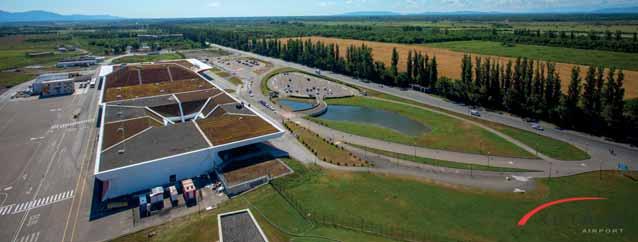
BY KETEVAN SKHIRTLADZE
The Wheelchair Fencing World Championships in Warsaw ended with the victory of the Georgian wheelchair fencing team.
The Georgian wheelchair fencing team won the fi rst gold medal for the Georgian Paralympic movement and were declared World Champions.
The heroes of the historic victory of Georgia’s wheelchair fencing national team are Irma Khetsuriani, Nino Tibilashvili, and Gvantsa Zadishvili.
The Georgian team defeated the Ukrainian team in the fi nal 45:44 to win gold.

Tamar Archuadze, UAG: Renovated Kutaisi International Airport to Employ 1200, Creating New Jobs for the Imereti Region
BY TEAM GT
Arrangement of the interior of the renovated Kutaisi International Airport has been completed, seeing the old and new terminals merged into one. According to Tamar Archuadze, Director of United Airports of Georgia, as a result of the expansion, Kutaisi International Airport will be able to serve 2.5 million passengers annually. "The airport is six times bigger than it used to be,” she notes. “Today, we have the capacity to serve 2.5 million passengers per year while handling 1200 passengers at peak times. Passengers will receive improved services at the renovated airport: more staff, more food facilities, and improved infrastructure.
“Passengers will also have the opportunity to self-check, baggage drop off, as well as to use international brand food outlets at the renovated Kutaisi airport,” she adds. “In implementing this expansion, additional jobs have been created for those living in the Imereti region: the airport, together with its contactors, will be employing up to 1200 people in future.”
She also notes that, as a result of merging the two terminals, Kutaisi Airport now has a single terminal with arrival and departure halls and all the equipment needed for smooth operation.
The concept-design of the David Agmashenebeli Kutaisi International Airport Terminal belongs to the Dutch architectural company UN STUDIO, and Mariam Karkarashvili, ArchitectDesigner of United Airports of Georgia, who adapted the existing concept to the airport requirements, and created the interior design of the terminal from the Georgian side.
The area of the old terminal of Kutaisi International Airport was 4800 square meters. As a result of the expansion, the total area of the terminal has been increased to 30,000 square meters. The number of check-in desks has increased from 10 to 18 (including two baggage drop-off desks). The number of border checkpoints has increased from 6 to 11 in the arrivals zone, and from eight to 14 on the take-off side, while the commercial space has increased from 200 m2 to 2,000 m2. As such, the newly expanded airport can now serve more than 2.5 million travelers per year, an increase of more than four times the passenger capacity of the previous terminal.
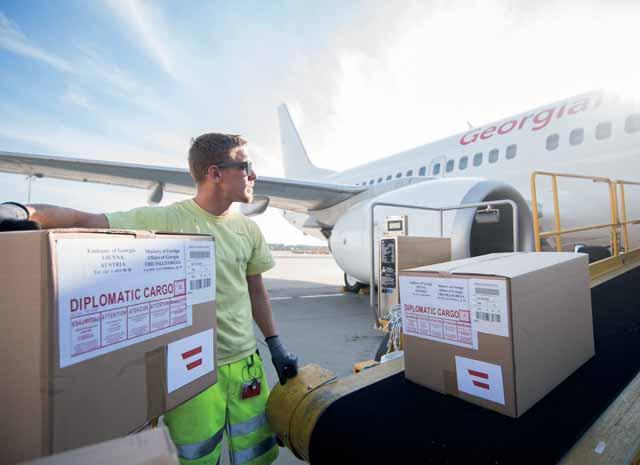
Georgian Animation Wins Two Prizes at Paris International Animated Film Festival
BY KETEVAN SKHIRTLADZE
AGeorgian animation has won two prizes at the Paris International Animation Film Festival (PIAFF).
‘Abandoned Village,’ an animation made by Mariam Kapanadze, won both the Jury Award and Audience Award.
“The idea of the fi lm had been growing in me for a long time, and the creation of the visual, artistic mood of the village itself is connected with Upper Imereti,” Kapanadze noted. “Abandoned Village is a metaphor for a person who has forgotten the main feeling that comes from creating a world of love.
“At fi rst, I had a script for a short feature fi lm, but then I changed my mind because I wanted to try the animation genre. For me, the important thing was to focus on the artistic side of the fi lm, that the example of one abandoned village, would make us, humans, remember an abandoned homeland, world, friend, or parent,” she added.
Austria Gifts and Delivers 5000 Doses of AstraZeneca

BY KETEVAN SKHIRTLADZE
Georgia received 5,000 doses of the AstraZeneca vaccine as a gift from the Austrian government this week, which has already arrived in Georgia.
“Happy to inform that 5000 doses of AstraZeneca vaccines handed as a gift to Georgia by Austria safely landed in Tbilisi airport.
“Austria has demonstrated true friendship and solidarity! Many thanks to Austrian counterparts MFA-Austria, every person involved! Much appreciated,” posted Keti Tsikhelashvili, Ambassador of Georgia to Austria on her Facebook page.
The Georgian Vice Prime Minister and Minister of Foreign Affairs, David Zalkaliani, responded to the event via Twitter, “Grateful to my colleague Alexander Schallenberg & MFA-Austria for 5000 doses of AstraZeneca Vaccine that have just arrived in Tbilisi. Joint efforts & cooperation in the fi ght against the COVID19 pandemic are of paramount importance. Your support is much appreciated,” he tweeted.
Source of a quote: fi lmmaker.ge
A Rock and A Hard Place - Experiences on the Ground at the July 6-7 Protests
Continued from page 1
Other members of the pro-Church movement were tame, and simply debated with the police over their allegiance.
Passing through the police line required not only a presentation of journalistic and personal credentials, but a short questioning. After some negotiation, the police allowed me to pass, despite verbal opposition from some of those nearby. The Pride contingent made no notice of my approach, and I entered their gathering uncontested.
At fi rst, the only visible signs of aggression were the shouts and jeers of each side, complemented with raised middle fi ngers and other related gestures. While both sides sported Georgian fl ags, some worn as capes, the Pride section also brandished European Union fl ags. Walking through the throng of people, a mixture of calm and anger could be felt. Some seemed to exhibit a relaxed nature while others were more militant in their position. While it did not seem alcohol was overtly present, the strong aroma of marijuana was, and was even witnessed being smoked on at least one occasion.
As the protest began to escalate, small fi reworks and eggs were thrown into the Pride group. Periodically, people would be seen ducking and dodging eggs coming into the crowd. Being near the police line, I was caught on two occasions by thrown eggs.
As I shifted to the southern side of the protest, more fi reworks were thrown, not just at the Pride protestors, but seemingly also at the police. Police special operations units began unloading equipment and moving into the parliament building. While most pro-Church protesters respected the increasingly strong police line, a faction of them had split off and moved into the nearby renovation area of the Youth Palace.
It began as an outfl anking maneuver, but quickly resorted to launching small wooden beams and both earthen and cement projectiles. I was unlucky enough to be struck by one on my leg, but was quickly pushed back by police. While the police corralled the nearby journalists and Pride protesters, a simultaneous counter assault by the offi cers in the area quelled the outbreak.
It was this display that made the police decide to begin moving Pride protesters and journalists off the parliamentary square. As the pro-Church organizers began to overwhelm the police lines, Pride demonstrators were moved into the side streets. Pro-Church members moved into the square, and took positions near the front steps. Leading members began taking turns making rallying speeches while a strong smell of eccliesatical incense began to fi ll the air.
For the remainder of the night, a heavy police presence saturated the historic Rustaveli Avenue. While most protesters, both pro-Church and Pride, began to dissipate, the control of law enforcement for both entry and exit of the area continued. Even as far away as Vera Park, offi cers were seen on watch, despite occasionally resting to enjoy coffee and a bakery item. Slowly, each side dispersed and the intense situation became docile.
Broadly speaking, it was tame by most standards. I never felt I was in any true danger, despite being hit by several of the projectiles. However, it can be noted that my threshold for what is “dangerous” could be regarded as slightly higher than normal, or even necessary. While the police will need to review their actions and make corrections in an afteraction report, a catastrophic outbreak of violence was avoided and each side was largely protected.
Structural damage and bodily harm was kept to a minimum, and those who attempted to engage in unlawful activities were arrested. Both sides will need to consult with themselves on how they will engage in dialogue at the next meeting, as there are signs of serious issues in this regard. Pro-Church members will

Pride protester displaying a rock that was allegedly thrown at him. Photo by Mike Godwin need to police their own and remove those seeking violence and severe aggression. Pride members will need to reduce their instigation tactics and ensure their members present an improved image on the national stage.
Finally, police will need to advance their crowd control tactics as well as become more fl uid and agile in responding to growing threats. While this is certainly not the last incident regarding the two opposing positions, it is another interesting chapter in what will be a reckoning for Georgia’s future on the world stage. With neither party backing down, it is likely that both sides will need to make concessions if there is to be any peace on the steps of Parliament.
For full coverage of Pride Week and all the latest news, check out georgiatoday.ge.

What the Namakhvani Protest Says about Georgian Politics
ANALYSIS BY SOLOMON ALVARES
The protests against the construction of the Namakhvani Hydroelectric Power Plant (NHPP), have been increasingly associated with the shady politics in Georgia. Anti-establishment tendencies are on the rise, and protests are mainly motivated by a lack of faith in the political parties. There is an increasing understanding among the populace that most of political parties are an indivisable political class bent on the pursuit of fi nancial gains and less interested in real development of the economy.
The Namakhvani project is a source of foreign direct investment (FDI) of a staggering $800 million. The infl ow of FDI into Georgia has been in decline for some time, aggravating Georgia’s poor economic performance, hampered by high infl ation, low salaries, and growing unemployment. The NHPP as a “historic project,” as it would create up to 2000 new jobs and solve one of Georgia’s most pressing energy troubles, as more than 35% of the energy consumed in Georgia is imported. This number is likely to grow in coming years.
Another argument of the proponents is that unless a project of this magnitude is implemented, the country’s energy security will be undermined, with the margin between local production and the level of import set to increase over the next years.
The NHPP is being constructed and managed by ENKA Renewables, which owns 90% of the project. The remaining 10% is owned by the Clean Energy Group company.
But there are also problems surrounding the project itself. Various allegations were confi rmed in a report published by the Georgian online media outlet Mtis Ambebi. In a “classifi ed” letter composed by the Justice Ministry, a number of negative remarks were made regarding the terms in the NHPP agreement.
There is a signifi cant background to the anti-NHPP protests, which gradually became an all-Georgia development. In 1978, the largest hydroelectric power plant in Georgia, a 251-meter-tall dam on the Inguri River was constructed. In the mid-1980s, the Khudoni hydroelectric power plant was planned on the Inguri River, but was halted within the decade due to public demonstrations.
The anti-NHPP protest evolved into a movement against the country’s entire political class. One example the protesters use is that in 2012, the Georgian Dream party, which at the time was a part of the country’s opposition bloc, promised local residents they would stop the construction of the NHPP. This means for the protest movement that the entire political class on both sides of the aisle, whether it is the United National Movement or Georgian Dream, are the same.
The anti-NHPP movement also coincided with the deep political crisis the country has been through over the past year when, as a result of the parliamentary elections in October 2020, the population grew increasingly tired of the political games between the parties. Drop in support among the population was significant. Furthermore, pandemicrelated economic problems aided the trend, which meant that at a certain point, major Georgian political parties could have been engulfed in an existential crisis against a people movement angered by shady politics within the government, regardless of which party was in charge.
However, the Tbilisi-based protest, supposed to be a turning point, failed to achieve its country-wide dimension. No serious concessions were made by the authorities. It is now also unlikely that the protests will lead to a change of power. Such rallies may become more frequent, but the government has taken the initiative. Propaganda-wise, on government-associated TV channels as well as through social media, a pro-NHPP agenda quickly managed to gain momentum. More and more people begin to think of the NHPP as a necessary project. This twist also coincides with a relative stabilization of the political life in the country, with opposition parties having entered the legislative after months of boycotting. Another strand of propaganda has been aimed at the leaders of the Namakhvani protest, criticizing their allegedly anti-Turkish stance (since ENKA is a Turkish company), thence xenophobic attitude. Some attempts to link the protests to Russia were also made. Furthermore, political parties too distanced themselves from discussions on the project.
In Georgia, there are growing sentiments against the political class. The latter, regardless which party is in power or opposition, is growingly seen as representing one entity, which has not been particularly vested in the improvement of the economy and social conditions of the country.
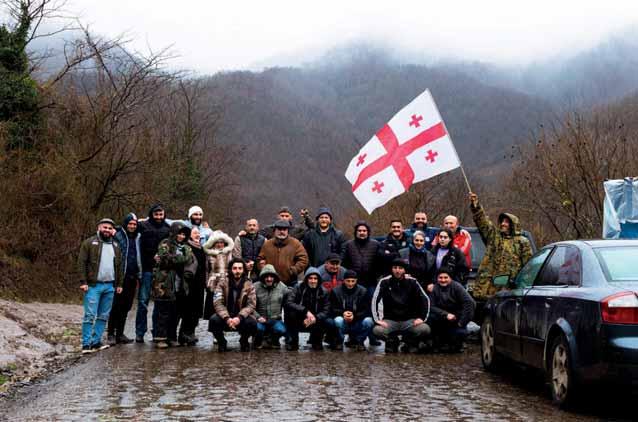
Georgia Needs to Do Better: Int’l Community Condemns the Anti-Pride Violence
BY TEAM GT
On July 5, as part of Pride Week in Tbilisi, a “March of Honor” was planned on Rustaveli Avenue. Because of the planned event, on June 5 and 6, homophobic groups took to the streets, harassed journalists, and raided offi ces. Due to the aggression of violent groups, the March of Honor was not held.
GEORGIA TODAY has compiled just some of the many reactions to the Tbilisi Pride Week events from Georgia’s international partners and supporters.
“We strongly condemn the July 5 violent attacks against civil activists, community members and journalists in Tbilisi, which regrettably forced the cancellation of the LGBTQI+ Pride March,” reads the statement released by MEPs Marina Kaljurand, Sven Mikser and Viola von Cramon Taubadel.
“Unfortunately, the Georgian authorities and religious representatives failed to speak loud and clear against homophobic rhetoric in the run-up to the Pride March. We deplore the Georgian government’s lack of readiness to guarantee the safety of this gathering devoted to tolerance.
“Like any other citizens, LGBTQI+ persons should be able to enjoy their constitutional rights such as participation in peaceful gatherings.
“The Georgian authorities have been vocal about their intention to apply formally for EU membership by 2024. In this respect, we wish to remind them that the prerequisites for accession to the EU, also known as the Copenhagen criteria, provide, among others, that a candidate country has stability of institutions guaranteeing democracy, the rule of law, human rights and respect for and protection of minorities.
“We expect the Georgian authorities to see that the perpetrators of the aforementioned attacks are apprehended and prosecuted to the fullest extent of the law,” reads the statement.
“LGBTQI+ rights are NOT a marginal issue,” Charles Michel, President of the European Council, noted Wednesday, adding that in the European Union, they don’t discriminate, they integrate.
Michel published a video of his speech at the plenary session of the European Parliament on Twitter.
“LGBTQI+ rights are NOT a marginal issue. They are concrete examples of how society relates to diversity, and how it relates to human dignity. It touches on our most intimate thoughts and beliefs: our fundamental liberties. In the European Union, we don’t discriminate. We integrate,” Michel stated.
“Democracy in Georgia is at stake, and all actors, including government, must act with full responsibility,” Czech Ambassador to Georgia Petr Mikyska said following the rallies.
“Shocked by scenes of violence, attacks on journalists and NGOs offi ces in Tbilisi. Perpetrators must be brought to justice immediately, constitutional rights and freedoms restored. Democracy in Georgia is at stake and all actors, including the government, must act with full responsibility,” the Ambassador tweeted.
US Department of State Spokesperson Ned Price also responded to the Priderelated events in Tbilisi, and condemned the violent attacks.
“We condemn the July 5 violent attacks in Georgia on civic activists, community members, and journalists. Georgia’s leaders and law enforcement are obligated to protect the constitutional rights to freedom of expression and assembly and prosecute those participating in violence,” he tweeted.
As a result of the assaults by the opponents of Tbilisi Pride, 47 media representatives were injured.
“Watching events across Tbilisi. Violence, threats towards the LGBTI+ and attacks on journalists, damage Georgia’s reputation as tolerant, hospitable country,” reads the statement released by the British Embassy in Georgia.
“We call on the authorities to prevent further violence and protect the individual rights and liberties of all Georgian citizens as per Georgia’s Constitution,” the Embassy said.

